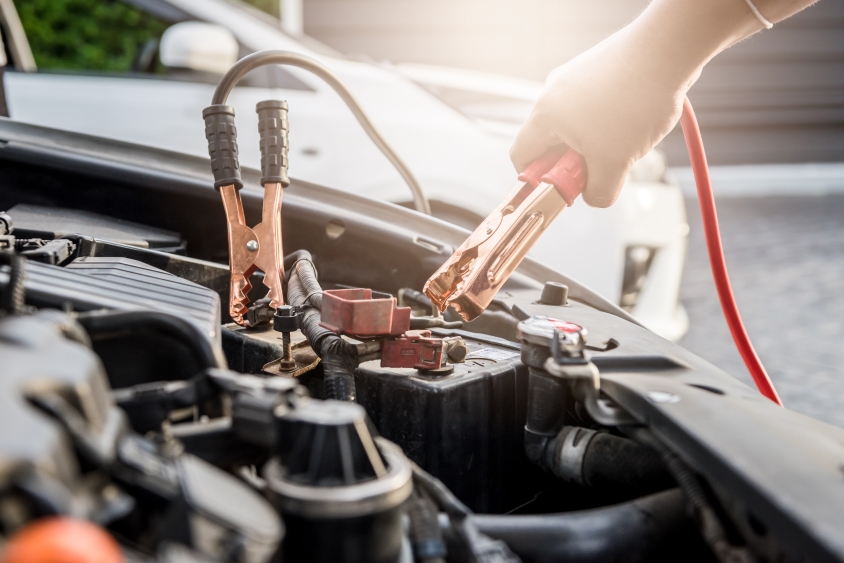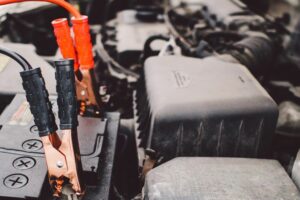10 Essential Car Tools To Always Keep In Your Fleet Vehicle
Written by: Marion Hanson, Last updated:18th December 2024

Driving can be one of life’s great joys, but it can also be a stressful experience if you find yourself stuck in a difficult situation on the road without the vehicle repair tools & supplies you need to get yourself out of it.
Why is it important to have car tools?
You can reduce your risk of suffering motoring disasters by ensuring your car is always stocked with vital fleet tools. The objects on this list might go unused a lot of the time, but you should always ensure you have them ready for an emergency.
1. Spare tyre and jack
While these are two separate items, they can be counted as one since neither is much use without the other.
Problems with the wheels and tyres are a common cause of vehicle breakdown, so you should always be prepared with the fleet equipment you need to change a tyre, this is shown in our guide to fleet management in winter, when potholes are a big problem on many roads.
It’s wise to check your spare tyre regularly so you know it’s in usable condition should you need it.
2. Jump leads
A flat battery is another common reason for cars to break down, why not read our guide on how to check your car battery? Jump leads can be a lifesaver if you’re stranded on the side of the road and a fellow motorist offers to help you out.
You can give yourself extra protection against your vehicle’s battery dying by keeping a portable battery pack in your car. This handy device allows you to get the battery running again without having to rely on another vehicle.
3. Basic toolkit
You never know what situations you might find yourself in out on the road and what mechanical problems your car might encounter, so it’s a good idea to have a selection of basic tools with you at all times.
Having a toolkit in your vehicle means you’ll always have easy access to implements like screwdrivers, pliers and a hammer, which could come in handy if you have car problems of your own, or if you need to help someone else who has broken down.
4. Tyre pressure gauge
Making sure your tyres are always inflated to the correct pressure level is vital for many reasons. It ensures you can brake and control the car properly at all times, and also has additional benefits like helping you get maximum mileage out of every tank of fuel.
Having a tyre pressure gauge accessible at all times makes it easy to check your tyres and to know when they need inflating.
5. Empty fuel can
Running out of fuel is a common fear among all motorists, and it can be particularly problematic if you’re on an important journey or if you need to get somewhere in a hurry.
With an empty fuel can in your car, you can feel confident that running out of petrol or diesel won’t be an insurmountable problem as long as you’re within walking distance of a refilling station.
6. First Aid Kit
Even the most simple of first aid kits are an important part of any driver’s fleet tools.
It’s great for basic medical supplies when you’re out and about, and could also serve to patch someone up after a minor accident.
Although it is no substitute for professional medical attention, a well-stocked first-aid kit can still prove to be valuable. You can often purchase a pre-stocked kit from most pharmacies, which you can add as you go.
7. Torch/Flashlight
A flashlight is one of the essential car tools for many reasons: it can be used for everything from lighting up dark spaces under and inside your car; to being used in an emergency as a beacon to signal for help.
They’re also a good thing to have for driver safety, and you should carry one if you find yourself stranded on the side of the road, especially at night or in overcast conditions. That extra bit of light might help make you more visible to other drivers.
8. Portable fire extinguisher
A fire extinguisher inside your fleet vehicle is one of the ways to add some extra safety to it.
Many fleet drivers believe that fire extinguishers are necessary only in CNG cars, but any car with any fuel for propulsion may catch fire due to a short circuit.
Remember, be sure to replace it whenever it crosses its expiry date.
9. Car manual
This should be in your car at all times. How else could you tell what the warning lights on your dashboard mean?
Your owner’s manual will also go into further detail about your car’s features, which is helpful when trying to remain as safe as possible in an urgent situation.
10. Duct tape
Perhaps the most versatile object of all, car owners have found many ways to repurpose duct tape for quick-fix duties in the case of unexpected leaks, cracks, and breaks.
Car servicing with Fuel Card Services
As well as having these items in your car, it’s wise to get your vehicle serviced regularly so it’s always in good condition and you’re aware of any mechanical problems.
You can save money on parts and labour, vehicle diagnostic tools, and also get useful benefits like calendar reminders, with MyService.Expert from Fuel Card Services.
back



